As Singapore FinTech Festival (SFF) x Singapore Week of Innovation and TeCHnology (SWITCH) came together for the first time in 2019 the Nordic countries were present in full force, including this year also five start-ups from Iceland.
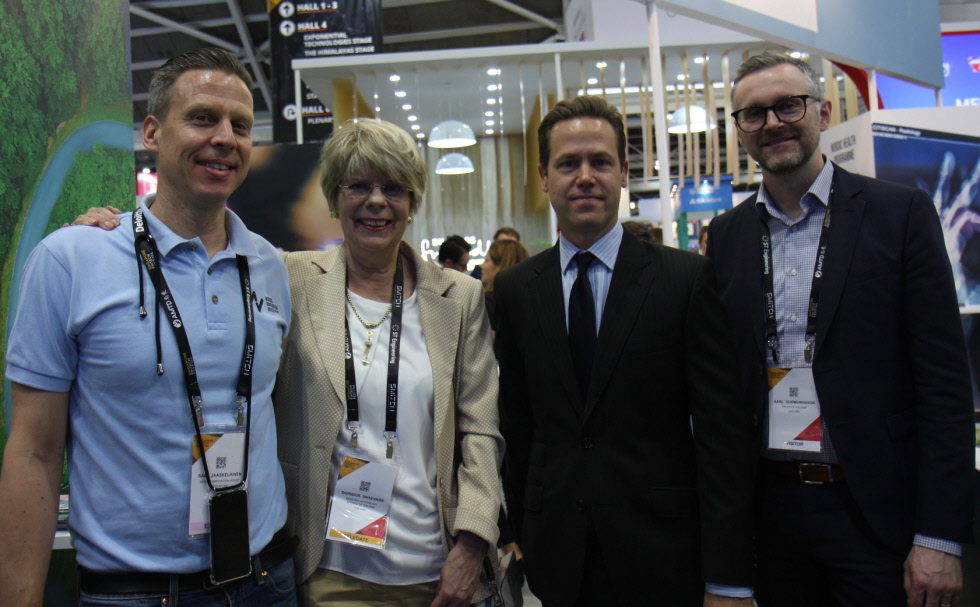
Ambassador of Iceland to Singapore, Ms. Sigríður Á. Snævarr, were in attendance and also hosted a welcome reception for the Icelandic companies.
Denmark’s embassy and Copenhagen Fintech Assocation had their own pavilion at SFF for the first time, while the Nordic Innovation House Singapore’s (NIH-SG) pavilion was a joint focal point for the representatives from the rest of the Nordics.
Sustainability and Climate Change was the overarching theme of the combined conference, where NIH-SG showcased Circular Economy and Energy Programmes.
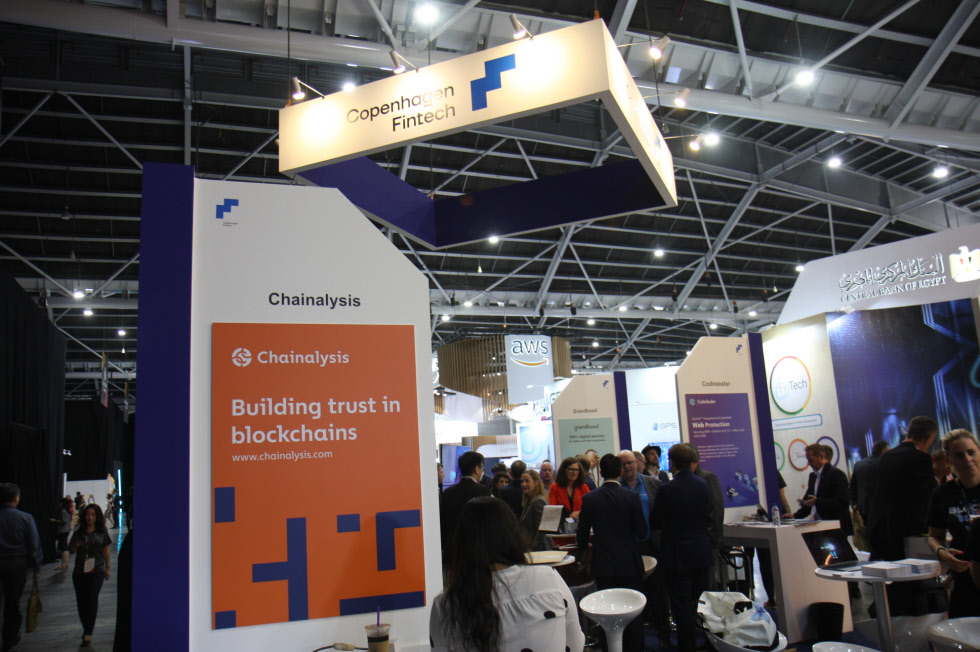
Within Fintech no less than 12 Nordic companies made pitches at SFF x SWITCH as well as Nordic Innovation House.
Mats Holmfeldt from Findec shared insights into the Nordic Fintech landscape.
NIH-SG, represented by Community Director Sami Jääskeläinen and Singapore Fintech Association (SFA), represented by its President Mr Hock Lai Chia, announced an official partnership.
SFA is intended as a platform designed to facilitate collaboration between all market participants and stakeholders in the Fintech ecosystem.
Mr Hock Lai Chia shared SFA’s details on the Singapore Fintech landscape, and began by thanking all the participants from the Nordics.
“I hope that by now you also know we are a global Fintech hub. Welcome to the largest fintech festival of the whole world, where we this year have 60 000 visitors from more than 130 countries,” began Hock Lai Chia.
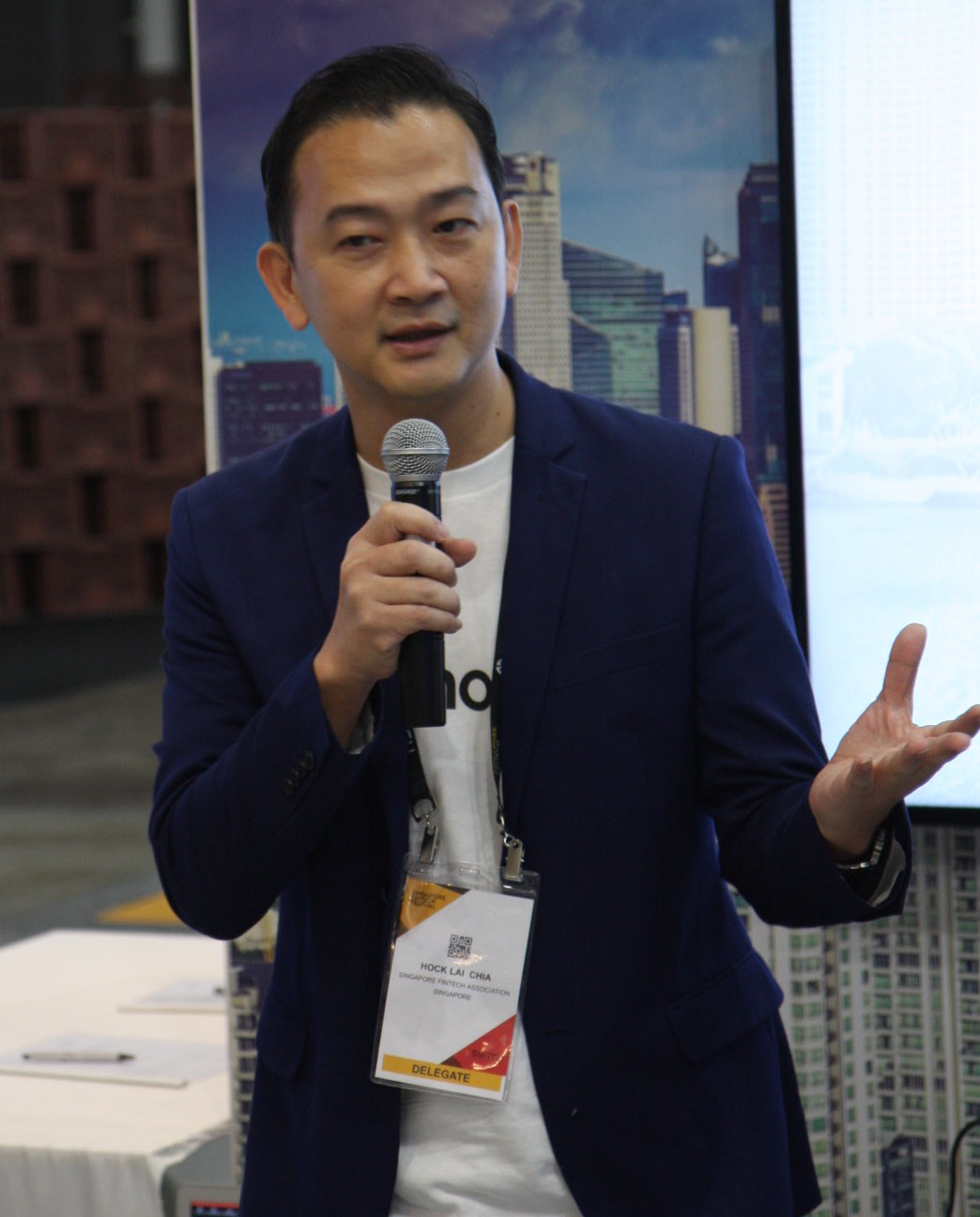
As he outlined the overview of the Fintech landscape in Singapore he pointed out that everyone would realise that Fintech is not just about Singapore, but about the region.
“In Singapore we have more than 600 Fintech and blockchain companies, which is about 40 percent of all such companies in SEA. Comparing to four years ago when we started our Fintech journey there were then less than fifty.”
Describiing the development since then he outlined five different factors: talent, access to a huge regional market, capital, infrastructure, and policy-making.
“Being one of the international financial centres we have a lot of financial talent in Singapore. In terms of technology talent we are still trying to resolve that challenge – so if there’s a lot of technology talent in the Nordics we welcome you here!”
He added that the hunt for talent is a challenge for many regions.
Regarding access to markets Singapore is small. However, for those who are into B2B Fintech there are good news, as the city state boasts over 200 financial institutions and with 40 of them having innovation labs in Singapore.
“Looking at B2C Fintech through Singapore as a gateway, you can reach out to not just Southeast Asia but also China and India, and Southeast Asia alone has a population size of 640 million. The country with highest population in this region is Indonesia, just a one-hour-flight away.”
“And we have a very active Fintech association; over the last three years I could see that Fintech is something that really cuts across borders. We have more than 50 collaborations internationally in 35 countries. So we can be a platform to reach out to many other markets in Asia,” he added.
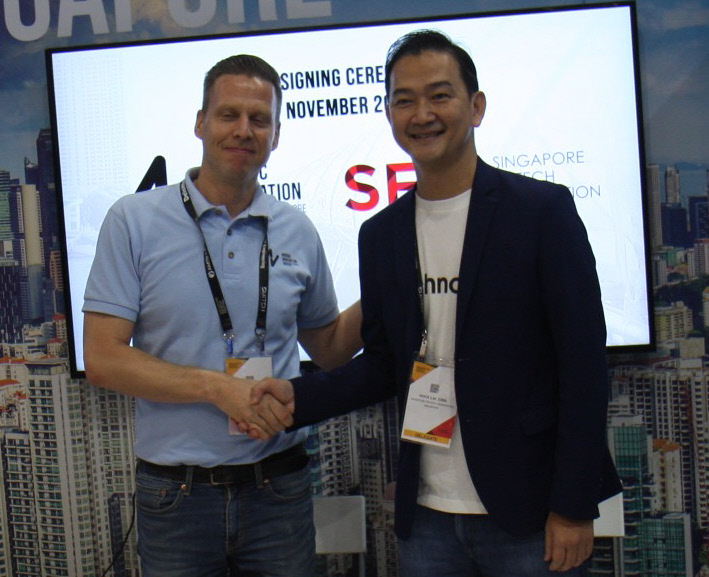
Looking at the investment side it is record so far in 2019. “In the first nine months of this year investment in Singapore already exceeded 1 billion Singapore Dollars, ranking only behind China and India.”
“We have a very conducive environment for investors. Many of the venture capitals and private equities set up their base in Singapore so we have close to 300 such investors .And we have a lot of programmes that curate Fintech companies to meet the investors. Singapore could also be a very attractive place to do your IPO.”
Within infrastructure, Hock Lai Chia mentioned that they are setting up a number of standards including allowing non-banks to access their payment systems in Singapore.
Policy-wise he mentioned the Fintech office in MAS (Monetary Authority of Singapore) where one can reach out to find out what kind regulatory licences to apply for. “And if you have a really innovative business model there is a regulatory sandbox and also another express regulatory sandbox whereby if your business model is lower risk you could get your approval within 21 days.”
The NIH-SG pavilion hosted Fintech pitches from the following start-ups: BehavioSec, Covr Security, EdenBull, Greater Than, Lendela, Mitigram, Unimaze, Wenn and ZignSec
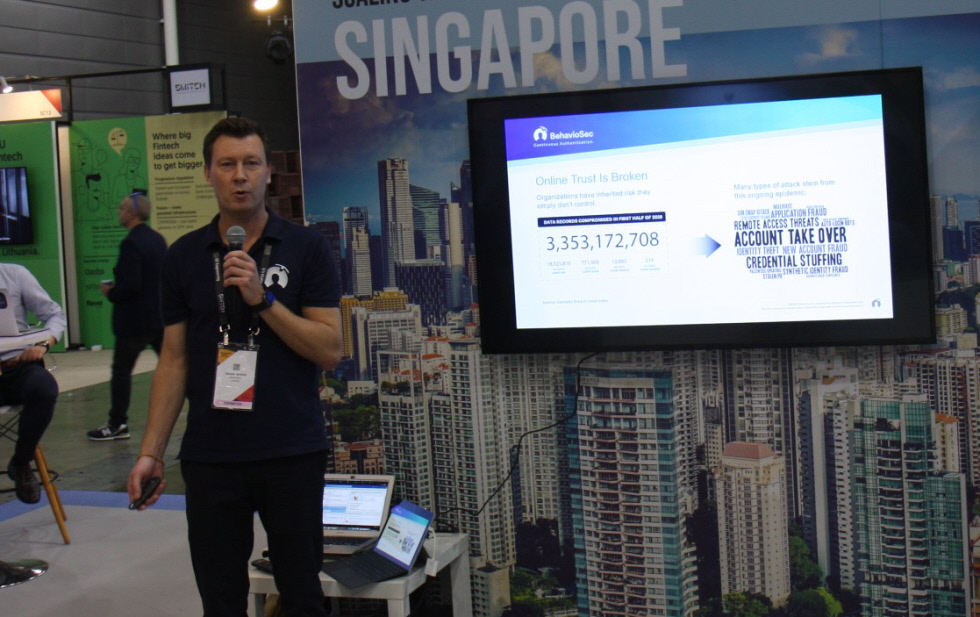
BehavioSec
BehavioSec offers its award-winning, behavioral biometrics software that uses continuous authentication to stop the problems created by digital fraud – without frustrating end users.
“We help our clients verify it is the right person in a web or mobile application, typically within the financial sector, like banking,” said Oscar Morén. The end user don’t know this is in the application itself; it’s how they interact with the device that we can verify the user to detect fraud.”
With a case Oscar explained how manual verification of risk-flagged transactions can be both time-consuming and non user-friendly.
“It’s all about reducing the friction and the alarm bells that you have within the financial sector.”
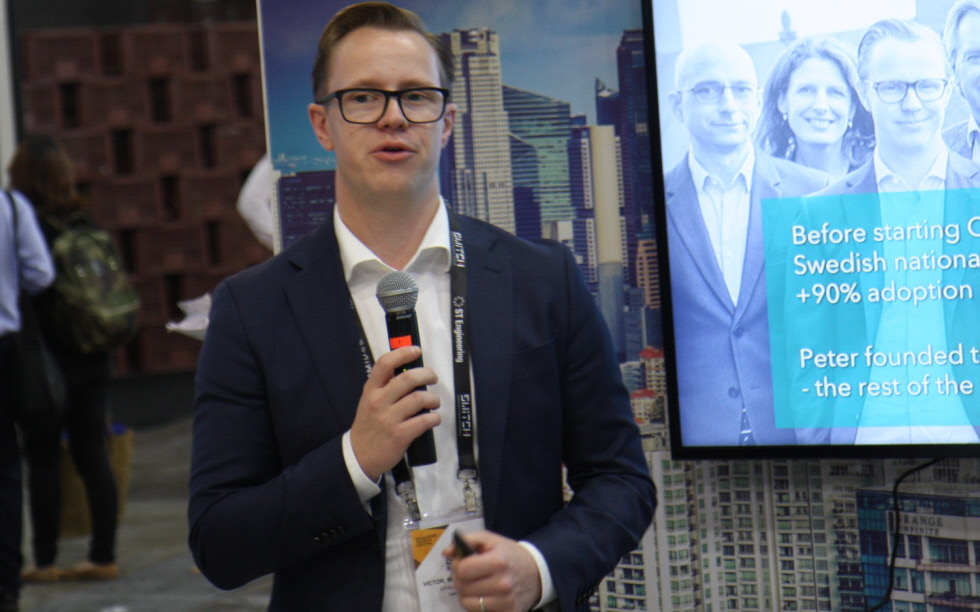
Covr Security
Covr Security is the legendary start-up behind Sweden’s BankID, established over 15 years ago.
“Thanks to that we have taken this technology out to completely new markets,” explained Victor Waenerlund about their user-centric mobile security management platform.
“Looking at it from a new perspective we have the bank security DNA within our system, we have a digital channel and we can communicate both ways. We have an isolated encryption working within every communication channel to ensure that we actually do not compromise any information being sent at any time.”
“Covr Security mainly works as white label solution. We want to deliver something to financial institutions worldwide where they can actually benefit from our solution within their application or create completely new applications as well. So currently we score any type of PKYC [Public Know Your Customer] within the market; we can help many different companies within that sector.”
Bank transactions, store purchases, cloud-based databases, online gaming and even the Internet of Things can use Covr to ensure 100% protection from ID theft, phishing, skimming and credit card hijacking.
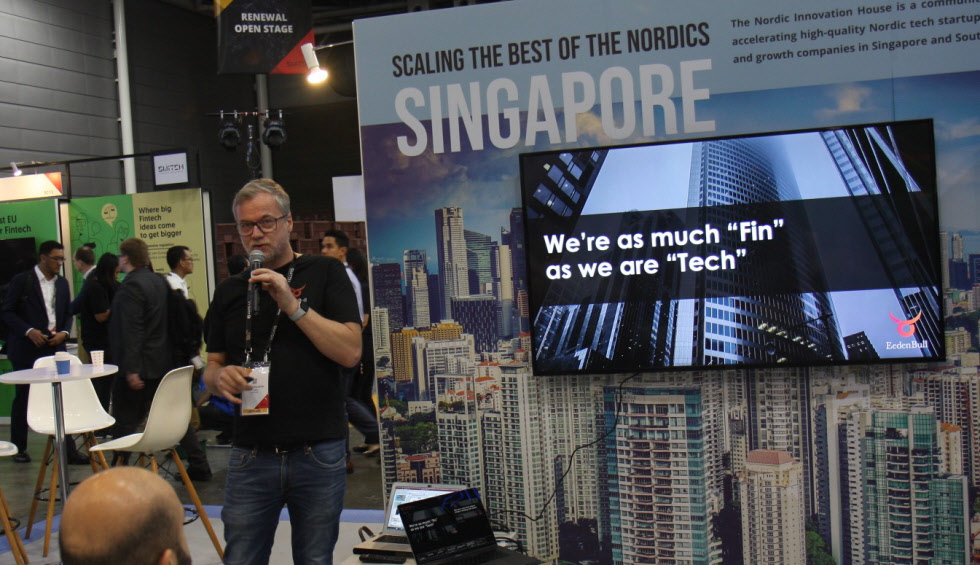
EedenBull
Erik Ingvoldstad introduced EedenBull by saying that they are a little bit different from everyone else: “We are as much Finn as we are Tech; we really focus on the financial part of it.”
Their first product, EedenBull Q Business, has just been launched.
EedenBull is a technology agnostic Fintech innovation company that helps banks create new products and services to increase revenue, customer loyalty and brand affinity.
“We work with banks, do not compete with them, and have long experience in the payment industry from all over the world, so we’re a global platform. We deliver complete platforms, not just technologies and experiences and we create competitive advantages for our partner banks.”
“The banking world has never been more complex and competitive than it is today. The pressure to innovate in order to solve new customer challenges is immense, and new legislation like open banking frameworks is changing the paradigm. In addition, fintech startups are ready to help themselves to the banks’ revenue. The only way to compete, is to constantly look for ways of making life easier for the customers – solving their problems, and taking away their daily frustrations,” is how EedenBull describes their customer market.
Eedenbull is the partner who understands not only the banks’ challenges, but most importantly the customers’ challenges; someone with the experience and the intrepid spirit to reinvent payments and banking.
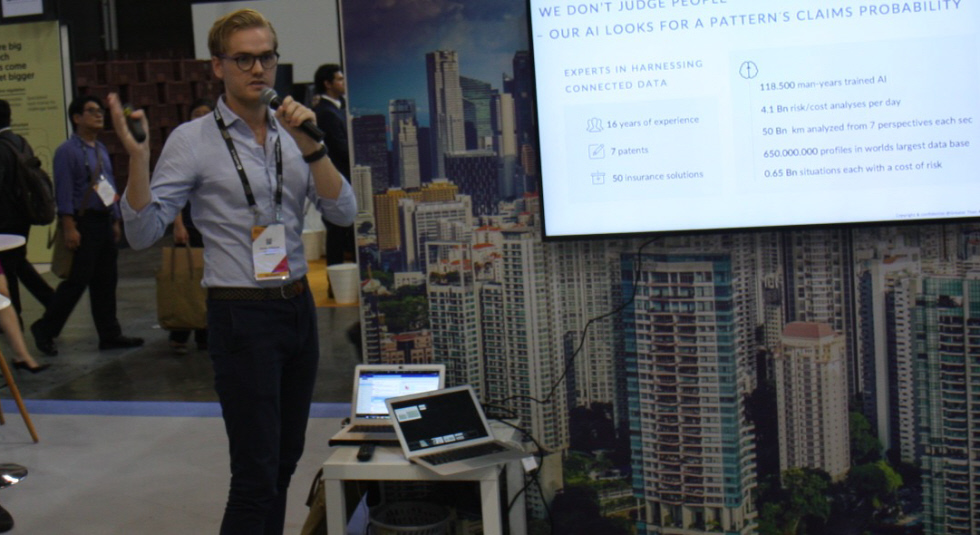
Greater Than
Greater Than helps auto insurance carriers improve loss ratio and car manufacturers with new business – by making this business sector smarter via AI (artificial intelligence).
Their AI (developed during over 14 years) can price risk in real time for people and based on this they sell white label insurance solutions to automotive OEMs, primarily insurance carriers, explained Johan Forseke.
“We do not judge people, we look at a claim probability patterns so when a vehicle is connected to our cloud, each second we analyse driving and when the drive is done we will say: the pattern has a claims probability of 30 % for example. That is the insight we give. Our technology has proven to reduce claims by up to 40 per cent.”
By starting to harness driving data at an early stage of the Big Data era, Greater Than has gained extensive experience in using driving data and Artificial Intelligence to create services that contribute to safer, smarter and more environmentally friendly driving.
“We have a profiling bank of 650 million profiling references – the largest profiling bank in the world.”
Now, with the insurance industry standing on the brink of a new, digital era Greater Than is also there to help insurers embrace it and digitalize their business – with lower costs, decreased claims frequency, less CO2-emissions and more value for their customers as a result.
The World WIldlife Fund, together with the Swedish Energy Agency, has estimated that the Greater Than technology can contribute to a global reduction of CO2 emissions by over 100 million tons per year.
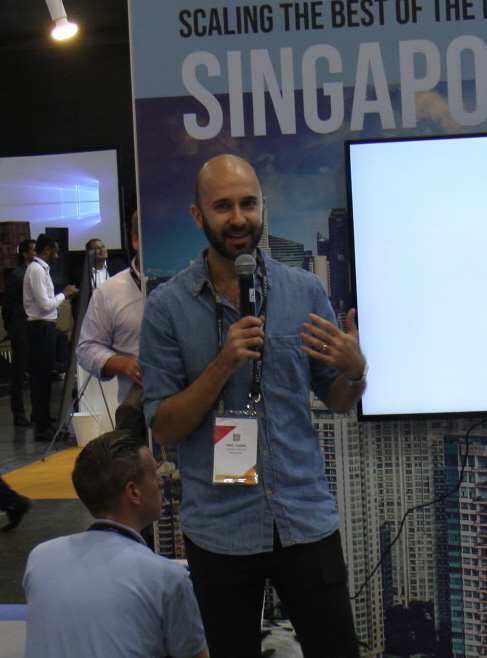
Lendela
Lendela, based in Singapore, is Southeast Asia’s first consumer-centric lending platform.
The problem we’re trying to solve is that even though there is a vast market for loans, including in Southeast Asia, unsecure lending is 400 billion in this region. There is huge demand for loans; a lot of people are under-banked and even unbanked, but the process of applying for a loan is very cumbersome,” said Nima Karimi.
If you think it’s complicated in the Nordics multiply that by ten and you’re here. We’re trying to solve that problem by being an independent platform that controls the entire process from application up until loan disbursement. So we acquire customers that are looking for a loan, and help them through the entire application process. We get them multiple offers, present these to the applicant and help them to choose the best offer. Then we help them with the final steps of the conversion and we do it all digital.”
On the lenders side usually only 2 per cent of applicants are normally interesting. “You do not want to approve too many borrowers and you have to get them through your application process and there are more drop-outs. In the end you might get a few conversions, but you have spent a lot of money to get those customers.”
Lendela take care of acquiring those customers, do the filtering and credit scoring, and on top of that they match-make by figuring out where a borrower is eligible for a loan and match to the right lenders.
Since a year ago they have launched in Singapore and entered Hong Kong, Malaysia and Thailand.
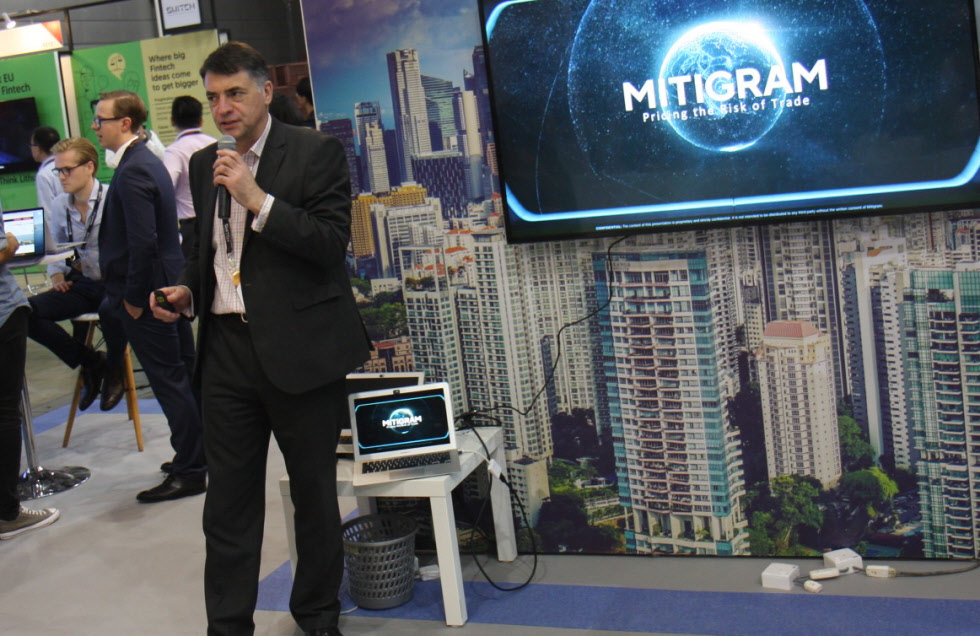
Mitigram
Mitigram was started in 2014 based on seeing the need to streamline and augment international trade by opening up a closed market with transformational innovation.
Mitigram’s important area of work is within trade finance – when exporters send goods to overseas buyers, explained Joshua Cohen and Martin Ritt.
Their initial service was developed in close cooperation with large Nordic global exporters.
“We are used by corporations who want to contact their banks – normally multiple banks – to provide quotations for discounting and risk coverage. We were originally asked by Ericsson and Volvo to improve their workflow efficiency. And we have a similar thing for banks who want to speak to other banks. That one facilitates different types of trade finance communication as well. What all of this do is bringing in a great deal of workflow efficiency; it catches data in a structure format that helps us to deliver bank analytics to everybody. And it provides a great deal of corporate governance around the whole process. So traditionally this process has been done using emails, instant messaging etc., none of which is structured and therefore not properly governed.”
“Workflow efficiency comes from removing the use of telephones and emails and replacing it with Mitigram. We force data to go into structured formats, which of course enable to feed back the structured format in the form of business analytics – which can help the corporates as well as the banks understand much better where they have the opportunity to improve what they’re doing; why they are missing business and how they could be doing business at better prices.”
100 banks and 40 large multinationals are today on their platform.
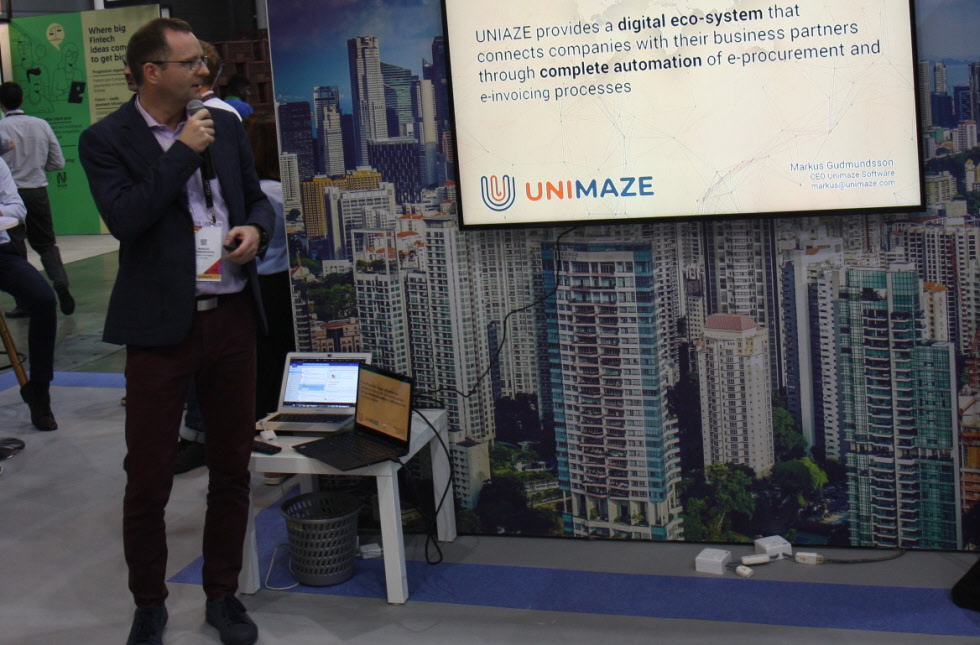
UniMaze
Markus Gudmundsson from UniMaze explained that they are in Singapore to look for partners to enter Asia.
“Our business is electronic invoicing, automating the flow of invoices from the supplier to the customer and other business documents to eliminate processes such as printing, transportation of the mail etc. There are a lot of benefits from both the supplier and customer, in reducing costs, and it’s green as well; we’re saving on paper.”
We work with partners. It’s a cloud-based solution. We have one platform for clients documenting to the stock exchange. There are all kinds of business documents that we exchange. We’re currently working on implementing an international invoice which will be out later. We also support procurement.”
Within Fintech financing data is available in real time and credit risk can be validated directly on sales and purchase invoices. And there are lots of possibilities to incorporate with banks and Fintech companies in factoring and reverse factoring as well, informed Markus.
UniMaze is already in use in Europe, New Zealand, Singapore and Australia.
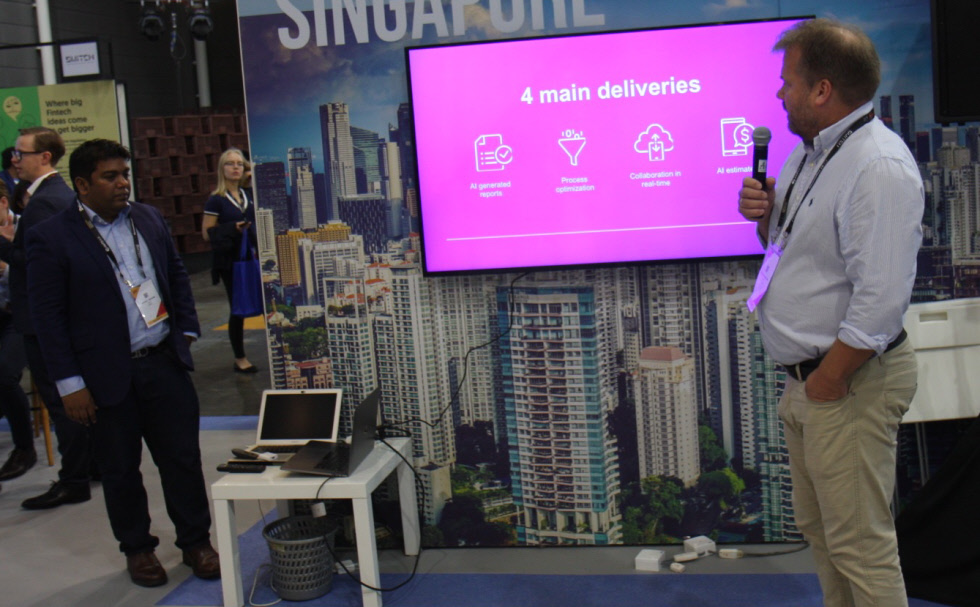
Wenn
From Wenn Jeevan Gnanam and Rolf Atleseloter presented their solution that is able to simplify the claims process for insurance companies – using AI.
“It can understand what kind of vehicle and brand it is, and also different parts. It can understand live what the damage ´consists in and with 90 per cent accuracy return the actual damage estimate.”
“For the user it is able to take pictures and upload their claim much quicker for a better user experience.”
It also collects better data from the location, they added.
“We are right now scaling in Europe and looking to scale in Asia. We have two Proof-of-Concepts with two very large insurance companies and are going forward with also processing in automating building damage as well, this is probably the next phase of our development.”
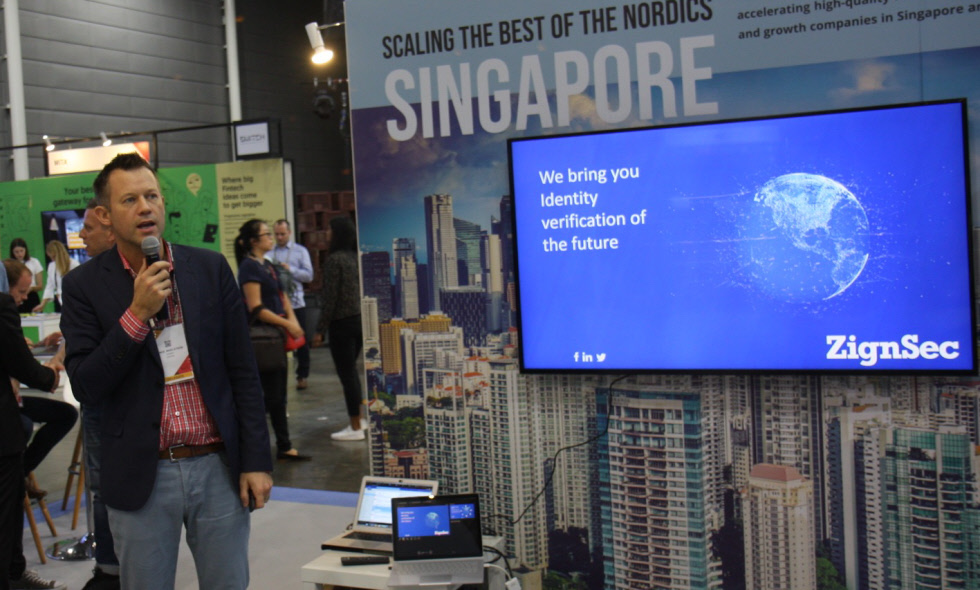
ZignSec
“We are brining identity to the world. We believe to be one of the most advanced companies in the KYC [Know Your Customer] change. We provide a platform – like many other companies in this change – but we have a very strong focus on identities and digital,” Jonas Ingelström began his introduction to ZignSec, a regtech company founded in Stockholm in 2015.
ZignSec is an identity service platform with the mission to simplify for companies to verify their customers online.
ZignSec offers secure and user-friendly KYC solutions by collecting all leading digital verification methods globally under one platform.
“The problem we are solving is that each country is coming up with its own identity solution nowadays and they are not compatible to each other; they look different and you connect to them differently. For any company working internationally it is not easy to connect to all of these. Nor is it easy to build the best user experience and this is what we are solving for our customers. There are also quite a lot of companies that don’t have an local identity scheme – where we have a very good online ID scan scheme. And the big thing is that we do a lot of recognition – finding out the real problems, such as fake passports – we can tell that in less than 10 seconds. You can also get automated responses where you can see where it’s fake.”




